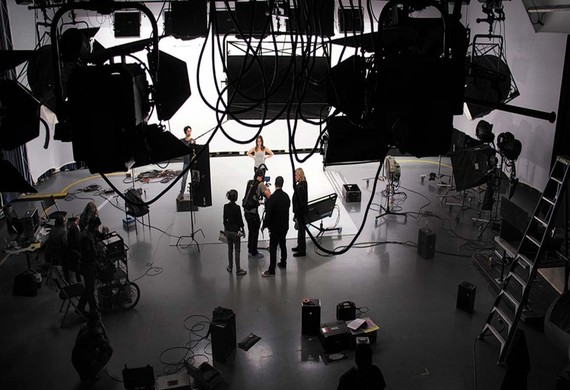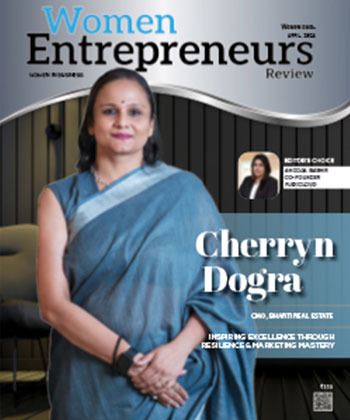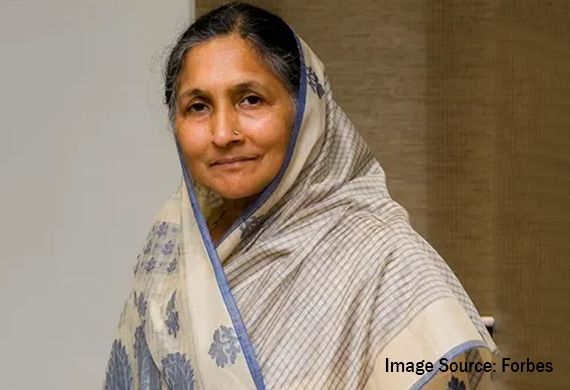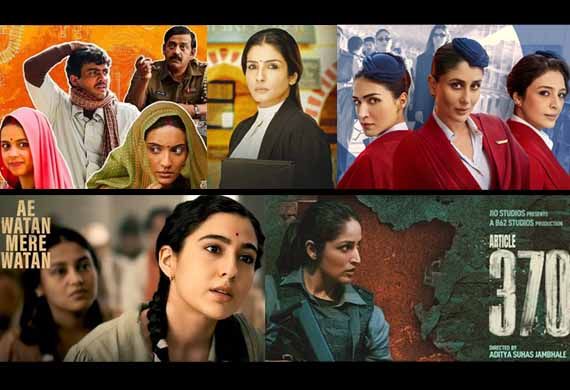
5 Critically Acclaimed Films Directed by Women
By: Srrayvinya OLM | Friday, 28 August 2020
With the outbreak of novel coronavirus, life as we know has come to a standstill! Offices, schools, movie halls, and a lot other public places have been shut down for many months together. While businesses have been affected a lot due to multiple lockdowns during this period, movie releases have come to a halt too. Yet, various entertainment platforms such as Netflix, Amazon Prime, Hotstar, Voot, and others have been catering to the demands of movie and TV series buffs all around the world with their exceptionally fast, clear and top-notch video on demand services. Well, we have curated the best five critically acclaimed films for you buffs to watch and satiate your predilection for movies during this lockdown!
A movie is critically acclaimed when a majority of critics (people who review films to determine their quality to the audience) offer a large amount of reviews that are deemed very positive. To articulate, ‘Critical’ refers to critics and IE reviewers – people who go see movies and give them ratings, typically experts on film analysis hired by major publications to tell audiences if movies are good or not. ‘Acclaim’ is a synonym for praised, liked or applauded. The best part about the below mentioned films is that they were directed by women who hold phenomenal track record in movie direction. So, wait no further and peruse the list!
Portrait of a Lady on Fire (2019) – Céline Sciamma
Portrait of a Lady on Fire is a 2019 French historical romantic drama film written and directed by Céline Sciamma, starring Noémie Merlant and Adèle Haenel. Poised in France in the late 18th century, the film narrates the story of a forbidden affair between an aristocrat and a painter commissioned to paint her portrait. Portrait of a Lady on Fire was selected to compete for the Palme d'Or at the 2019 Cannes Film Festival. The film won the Queer Palm at Cannes, becoming the first film directed by a woman to win the award. The film was theatrically released in France on 18 September 2019. It was nominated for Independent Spirit Awards, Critics’ Choice Awards and Golden Globe Awards for Best Foreign Language Film and was chosen by the National Board of Review as Top Five Foreign Language Films of 2019. Sciamma also won the award for Best Screenplay at Cannes for this movie.
Céline Sciamma is a French screenwriter and film director. A common theme in Sciamma’s films is the fluidity of gender and sexual identity among girls and women. Sciamma’s debut film, Water Lilies, was selected for screening in the section Uncertain regard at the 2007 Cannes Film Festival. The film secured three nominations for the 2008 César Awards while Sciamma was nominated for the César Award for Best Debut, and actresses Adèle Haenel and Louise Blachère were both nominated for the César Award for Most Promising Actress. Sciamma directed her first short film – Pauline, in 2009 as part of a government anti-homophobia campaign called ‘Five films against homophobia’.
Her other film Tomboy (2011) was written and shot in a matter of months. Sciamma wrote the script in three weeks, completed casting in three weeks, and shot the film in 20 days. It premiered at the 61st Berlin International Film Festival in the Panorama section of the festival. The film was shown in French schools as part of an educational program. Her 2014 film Girlhood was selected to be screened as part of the Directors’ Fortnight section of the 2014 Cannes Film Festival. It also played at the 2014 Toronto International Film Festival and the 2015 Sundance Film Festival. In interviews, Sciamma said that Girlhood would be her last coming-of-age film and that she considered it, Water Lilies and Tomboy a trilogy.
Since 2015, Sciamma has served as the Co-President of the SRF (Society of Film Directors). In between directing her own films, Sciamma continues to work as a screenwriter for other directors. She was sought after by André Téchiné, whose work Sciamma admired as a youth, to co-write the screenplay for his 2016 film Being 17.
Zero Dark Thirty (2012) – Kathryn Ann Bigelow
Zero Dark Thirty is a 2012 American thriller film directed by Kathryn Bigelow and written by Mark Boal. The film dramatizes the nearly decade-long international manhunt for Al-Qaeda leader Osama bin Laden after the September 11 attacks. This search leads to the discovery of his compound in Pakistan and the military raid that resulted in bin Laden’s death on May 2, 2011.
Zero Dark Thirty received acclaim and appeared on 95 critics’ top ten lists of 2012. It was nominated in five categories at the 85th Academy Awards, including Best Picture, Best Actress for Chastain, Best Original Screenplay, and Best Film Editing, and won the award for Best Sound Editing, shared with Skyfall. It also earned Golden Globe Award nominations for Best Motion Picture – Drama, Best Director, and Best Screenplay, with Chastain winning the award for Best Actress in a Motion Picture – Drama.
The depiction of so-called ‘enhanced interrogation’ generated controversy, with some critics describing it as pro-torture propaganda, as the interrogations are shown producing reliably useful and accurate information. Acting CIA director Michael Morell felt the film created the false impression that torture was key to finding bin Laden. Others described it as an anti-torture exposure of interrogation practices.
Kathryn Ann Bigelow is an American film director, producer, and screenwriter. Covering a wide range of genres, her films include Near Dark (1987), Point Break (1991), Strange Days (1995), K-19: The Widowmaker (2002), The Hurt Locker (2008), Zero Dark Thirty (2012), and Detroit (2017).
With The Hurt Locker, Bigelow became the first and, as of 2020, only woman to win the Academy Award for Best Director, the Directors Guild of America Award for Outstanding Directing, the BAFTA Award for Best Direction, and the Critics' Choice Movie Award for Best Director. She also became the first woman to win the Saturn Award for Best Director in 1995 for Strange Days. Bigelow was included on the 2010 Time 100 list of most influential people of the year.
Lady Bird (2017) – Greta Gerwig
Lady Bird is a 2017 American coming-of-age comedy-drama film written and directed by Greta Gerwig in her solo directorial debut. The cast includes Saoirse Ronan, Laurie Metcalf, Tracy Letts, Lucas Hedges, Timothée Chalamet, Beanie Feldstein, Stephen McKinley Henderson, and Lois Smith. Set in Sacramento, California, between the fall of 2002 and the summer of 2003, it is a coming-of-age story of a high school senior and her strained relationship with her mother.
The film premiered at the Telluride Film Festival on September 1, 2017, and was released in the United States on November 3, 2017, by A24. It received critical acclaim for Gerwig’s screenplay and direction, and the performances of Ronan and Metcalf. Lady Bird was chosen by the National Board of Review, the American Film Institute, and Time magazine as one of the ten best films of the year. At the 90th Academy Awards, it earned five nominations: Best Picture, Best Actress (for Ronan), Best Supporting Actress (for Metcalf), Best Original Screenplay, and Best Director. At the 75th Golden Globe Awards, the film won two awards – Best Motion Picture (Musical or Comedy) and Best Actress in a Musical or Comedy (for Ronan) and was nominated for two others. It was also nominated for three British Academy Film Awards.
Greta Celeste Gerwig is an American actress and filmmaker. She first garnered attention after working on and appearing in several mumblecore films. Between 2006 and 2009, she appeared in a number of films by Joe Swanberg, some of which she co-wrote or co-directed, including Hannah Takes the Stairs (2007) and Nights and Weekends (2008).
Since the early 2010s, Gerwig has collaborated with her partner Noah Baumbach on several films, including Greenberg (2010), Frances Ha (2012), for which she received a Golden Globe Award nomination, and Mistress America (2015). She also appeared in Whit Stillman’s Damsels in Distress (2011), Woody Allen’s To Rome with Love (2012), Rebecca Miller’s Maggie’s Plan (2015), Pablo Larraín's Jackie (2016), Mike Mills’ 20th Century Women (2016), and Wes Anderson’s Isle of Dogs (2018).
Gerwig has had two solo directorial ventures, the coming-of-age films Lady Bird (2017) and Little Women (2019), both of which earned nominations for the Academy Award for Best Picture. For the former, she received Academy Award nominations for Best Director and Best Original Screenplay, and for the latter, she was nominated for Best Adapted Screenplay.
The Japanese Wife (2010) – Aparna Sen
The Japanese Wife is a 2010 Indian-Japanese romantic drama film directed by Bengali filmmaker Aparna Sen. It stars Rahul Bose, Raima Sen and Moushumi Chatterjee, and Japanese actress Chigusa Takaku in the title role. It is in English, Bengali and Japanese. The film was originally scheduled for release in October 2008, but the release was delayed until 9 April 2010. The story revolves around a young Bengali village school teacher (Rahul Bose) marrying his Japanese pen friend (Chigusa Takaku) over letters and remaining true and loyal to her throughout his life, while actually never meeting her.
Aparna Sen is an Indian film director, screenwriter and actress who is known for her work in Bengali cinema. She has received multiple awards, including nine National Film Awards and a Padma Shri. Sen made her film debut at the age of 15, when she played the role of Mrinmoyee in the Samapti portion of the 1961 film Teen Kanya (Three Daughters) directed by Satyajit Ray (who was a longtime friend of her father’s). She then studied at Kolkata's Presidency College. At fifteen she was photographed by Brian Brake for the well-known photo from his 1960 ‘Monsoon’ series of photographs; the photo appeared on the cover of Life.
In 2009, Sen appeared with Sharmila Tagore and Rahul Bose in Annirudh Roy – Chowdhary’s Bengali film Antaheen. The film went on to win four National Film Awards. Sen announced her next Bengali film Iti Mrinalini, which starred Konkona Sen Sharma, Aparna Sen, Rajat Kapoor, Kaushik Sen, and Priyanshu Chatterjee. First-time screenwriter Ranjan Ghosh co-authored Iti Mrinalini. This was the first time that Sen collaborated with any film writer or became attached to the curriculum of a film institute. It was a major first in Indian screenwriting, as the first time that any screenplay from an Indian film institute was actually filmed.
In 2013, her film Goynar Baksho (The Jewellery Box) was released depicting three generations of women and their relationship to a box of jewels. It ran to packed houses and won critical acclaim from reviewers and critics. Thereafter, in 2015, Arshinagar, an adaptation of Romeo and Juliet was released. In 2017, Sonata – an English film written and directed by Sen – was released. Adapted from a play by Mahesh Elkunchwar, the film examines the life of three middle-aged unmarried friends played by Aparna Sen, Shabana Azmi and Lillete Dubey.
Winter’s Bone (2010) – Debra Granik
Winter’s Bone is a 2010 American mystery drama film directed by Debra Granik. It was adapted by Granik and Anne Rosellini from the 2006 novel of the same name by Daniel Woodrell. The film stars Jennifer Lawrence as a teenage girl in the rural Ozarks of Missouri who, to protect her family from eviction, must locate her missing father. The film explores the interrelated themes of close and distant family ties, the power and speed of gossip, self-sufficiency, poverty, and patriarchy as they are influenced by the pervasive underworld of illegal meth labs.
The film won several awards, including the Grand Jury Prize: Dramatic Film at the 2010 Sundance Film Festival. It also received four Oscar nominations: Best Picture, Best Adapted Screenplay, Best Actress for Lawrence and Best Supporting Actor for John Hawkes.
Debra Granik is an American filmmaker. She is most known for 2004’s Down to the Bone, which starred Vera Farmiga, 2010’s Winter’s Bone, which starred Jennifer Lawrence in her breakout performance and for which Granik was nominated for Academy Award for Best Picture and Best Adapted Screenplay, and 2018’s Leave No Trace, a film based on the book My Abandonment by Peter Rock.
While at Brandeis, Granik took Henry Felt’s film and media workshop production class and volunteered with the Boston grassroots filmmaking organization Women's Video Collective. She also took film classes at the Studio for Interrelated Media at the Massachusetts College of Art. During this time, Granik made educational films for trade unions on subjects like workplace health and safety, one of which was made for the Massachusetts Division of Occupational Safety.[ Granik worked in production on educational media projects, eventually working on long form documentaries by Boston-area filmmakers before deciding to go to graduate school for filmmaking at New York University.
In 1997, Granik directed her first short film, Snake Feed, as her senior thesis with the mentorship of NYU film professor Boris Frumin, who was instrumental in sharing his love of post-World War II European neorealist films. Snake Feed, which began its life as a seven-minute documentary portrait exercise, was accepted into Sundance Institute's Lab Program for screenwriting and directing. Granik workshopped and developed the short film into a feature film at the Sundance Lab. Granik has said that Snake Feed was a work of narrative fiction, with the main characters, recovering addict Irene and her boyfriend Rick, playing dramatized versions of themselves.
It’s hard to see a film one time and really get it, and write fully and intelligently about it. That’s a review. That’s not film criticism.






